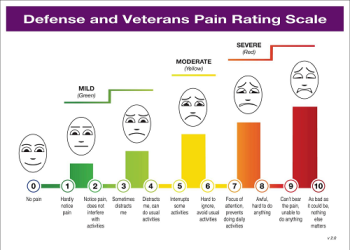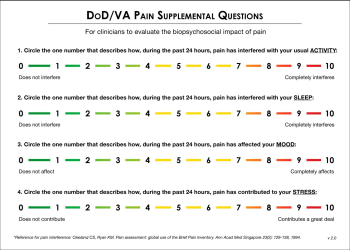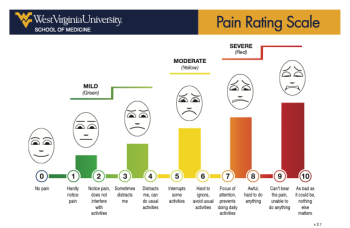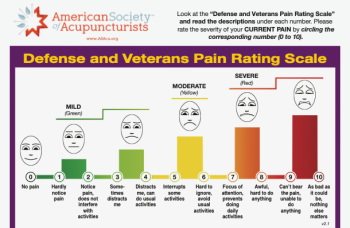About the Defense and Veterans Pain Rating Scale (DVPRS)
The Defense and Veterans Pain Rating Scale (DVPRS) is a pain assessment tool that utilizes a numerical rating scale enhanced by functional word descriptors, color coding, and pictorial facial expressions matched to pain levels. Four supplemental questions measure how much pain interferes with usual activity and sleep, and affects mood and contributes to stress.
DVPRS DOWNLOADABLE VERSIONS
Note: Permission is granted for clinicians, researchers and organizations to freely use the DVPRS as is, without alteration. If used in revised or altered form (including use without supplemental questions), it should not be labeled or referred to as the Defense and Veterans Pain Rating Scale (DVPRS).
TESTIMONIAL
“I used the DVPRS yesterday afternoon for the first time. Indeed, the process allowed me to obtain information from the patient I think I would otherwise not have appreciated from my usual assessment. Specifically, it was the way the pain has interfered with sleep that bothered her the most, affecting her mood and causing her stress. That conversation confirmed the choices she and I made about how to address her pain. The rating scale added depth to my understanding and made me feel more solid in my recommendations...”
Jennifer Boyd, PA-C
Primary Care Provider in a Federally Qualified Health Center, West Virginia
Rebranding DVPRS
Clinicians, researchers and organizations may request permission to re-brand the DVPRS (see below) to more effectively reach their respective patient population. Contact DVCIPM for more information.
DVPRS Videos
This video provides an overview of why the DVPRS was developed and how it can be utilized in clinical care. (opens on Vimeo)
DVPRS FROM A PATIENT'S PERSPECTIVE
The video provides an overview from the patients perspective of how the DVPRS improves the pain conversation between a clinician and patient, and why that is important for improving outcomes not only in pain intensity, but other areas such as physical functioning. (Opens on Vimeo)
REFERENCES
Buckenmaier CC, Galloway KT, Polomano RC, McDuffie M, Kwon N, Gallagher RM. Preliminary Validation of the Defense and Veterans Pain Rating Scale (DVPRS) in a Military Population. Pain medicine (Malden, Mass). 2013;14(1):110-123. doi:10.1111/j.1526-4637.2012.01516.x
Cahana A. What Would Bonica Say? A Word on the DVPRS Validation Study. Pain medicine (Malden, Mass). 2013;14(1):1-2. doi:10.1111/pme.12042
Nassif TH, Hull A, Holliday SB, Sullivan P, Sandbrink F. Concurrent Validity of the Defense and Veterans Pain Rating Scale in VA Outpatients. Pain medicine (Malden, Mass). 2015;16(11):2152-2161. doi:10.1111/pme.12866
Polomano, R. C., Galloway, K. T., Kent, M. L., Brandon-Edwards, H., Kwon, K. N., Morales, C., & Buckenmaier III, C. T. (2016). Psychometric testing of the Defense and Veterans Pain Rating Scale (DVPRS): a new pain scale for military population. Pain Medicine, 17(8), 1505-1519.
Buckenmaier CC, Galloway KT, Polomano RC, Deuster P. Pain as a Barrier to Human Performance: A Focus on Function for Self-Reporting Pain With the Defense Veterans Pain Rating Scale. Journal of special operations medicine. 2016;16(2):82-87. doi:10.55460/S27H-8173
Giordano NA, Kent M, Buckenmaier CC, et al. A Longitudinal Comparison of Patient-Reported Outcomes Measurement Information System to Legacy Scales in Knee and Shoulder Arthroscopy Patients. Arthroscopy. 2021;37(1):185-194.e2. doi:10.1016/j.arthro.2020.07.026
Piva SR, Switzer GE, Mikolic JM, et al. Validity of the Modified Defense and Veterans Pain Rating Scale Supplemented With Items Germane to Total Joint Replacement: Secondary Analysis From a Randomized Trial. Military medicine. 2023;188(9-10):e3017-e3025. doi:10.1093/milmed/usad155
Sabharwal S, Skolasky RL, Souza JM, Potter BK, Forsberg JA. Concurrent Validity of PROMIS With DASH and DVPRS in Transhumeral Amputees. Hand (New York, NY). 2023;18(5):845-848. doi:10.1177/15589447211073833
Costantino RC, Gressler LE, Highland KB, Oehrlein EM, Villalonga-Olives E, Perfetto EM. Patient-centeredness and psychometric properties of the Defense and Veterans Pain Rating Scale 2.0 (DVPRS). Pain medicine (Malden, Mass). 2024;25(1):57-62. doi:10.1093/pm/pnad125
Gallagher RM, Buckenmaier CC, Polomano RC, et al. The psychometric strength and patient centeredness of the Defense and Veterans Pain Rating Scale. Pain medicine (Malden, Mass). 2024;25(1):93-95. doi:10.1093/pm/pnad156
Dannecker EA, Darchuk KM, Shigaki CL, Palmer WM, Korte PT, Turner EK. The Use and Perceptions of the Defense and Veterans Pain Rating Scale by Nursing Personnel. Pain management nursing. 2024;25(2):113-121. doi:10.1016/j.pmn.2023.09.001
Safran SL, Follonier D, Weber E, Vayne-Bossert P, Ahrendts U, Rehberg-Klug B. Cross-cultural adaptation and psychometric validation of the French version of the Defense and Veterans Pain Rating Scale for acute and chronic pain: a prospective clinical study. Pain medicine (Malden, Mass). 2024;25(10):630-636. doi:10.1093/pm/pnae049





